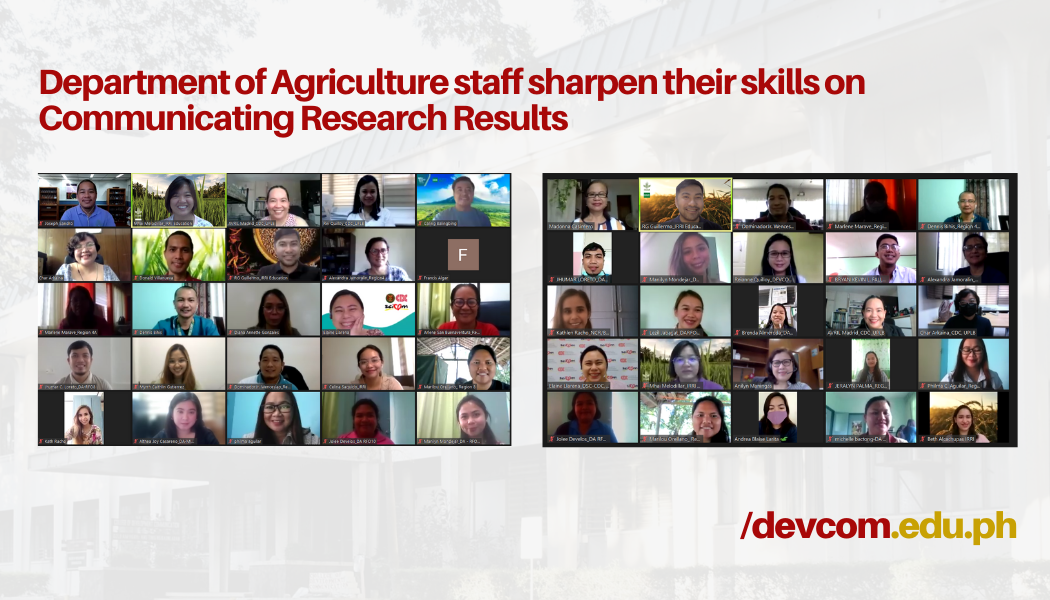Over the past decades, research has become more vigorous that it is necessary to make research results known to the public and technologies to be made available to its beneficiaries. Communication is a necessary skill a researcher should have in order to fulfill this role.
Recognizing this need, an online training course entitled “Communicating Research Results” was conducted by IRRI Education, in partnership with the Department of Science Communication (DSC) of UPLB’s College of Development Communication. The training was held from March 16 to 19, with 22 participants from the Department of Agriculture Regional Field Offices. The training team from DSC and IRRI Ed crafted a training program to introduce principles and practical techniques on how to communicate agriculture research results. The training is part of the Department of Agriculture project “ Strengthening the Capability of the NARES partners for Research Development and Extension of Climate Ready Information and Technologies to Rice-based Farming Communities in the Philippines (SERVE)” funded by the Department of Foreign Affairs and managed by the Bureau of Agricultural Research through IRRI.
The DSC Training Team is composed of Dr. Elaine Llarena, Assistant Professors Avril de Guzman and Reianne Quilloy, and University Extension Specialist Charlene Mae Arkaina. They designed and served as resource speakers for the training. The training team discussed and facilitated activities on determining how to communicate research data for specific audiences or stakeholders. Techniques on clear and effective writing of research findings as well as data visualization were also discussed. The participants, in their worksop sessions, applied the techniques they learned on the principles of effective writing and visual design. They were provided with practical tips on preparing a writing plan, editing, and revising their work. Participants were also introduced to using graphic design and editing software tools such as Canva and Grammarly. The participants showcased their work to the training team and IRRI experts Engr. Calling Balingbing, Engr. Joseph Sandro, Beni Hardinero, and Donald Villanueva, who gave their feedback for the improvement of the communication material. The top three designs voted by the participants were recognized during the closing program.
IIn one of the sharing sessions during the online training, participants reflected on how much they have learned about the importance of communicating research results to different stakeholders. Ms. Manilyn Mondejar of DA Region 10 expressed, “the training helped me become more productive, now that I know how to communicate research results. I am thankful for the resource speakers because of their help throughout the training program. They gave a lot of constructive criticism that is why I was able to develop this material. I was able to learn how to develop a writing plan. I’m in cloud nine. I’m thankful for IRRI for inviting me as one of the participants.”
Althea Joy Casareno from DA MIMAROPA also shared that she learned about new ways to communicate research results or output. “Before, we used to produce the materials in a crude way (mano mano). I learned some of my colleagues are not yet familiar with Canva. Now that I learned how to use it, I can share to fellow researchers how to use Canva.” She also shared to fellow participants to not feel intimidated in creating communication materials. “Most importantly, think about your audience, before you write,” she said.
Jhumar Loreto, Agriculturist from Region 8, shared about the importance of writing: “writing is not that easy, but it is very important to plan what to do, especially for us on research, after conducting the project, what to do next , to relay results to farmers.”
Dr. Madonna Casimero, Project Leader of SERVE project was pleased about the output of the training. She further expressed, “I am happy how confident you have become as an effective communicator after this training course. It is our aim that you are able to communicate about the research and technologies you are promoting for our farmers and fisherfolks.“ (RMQuilloy)

